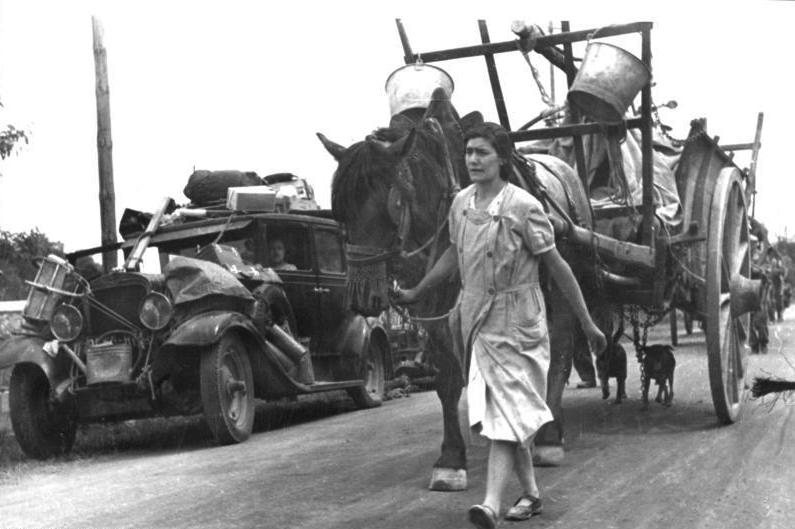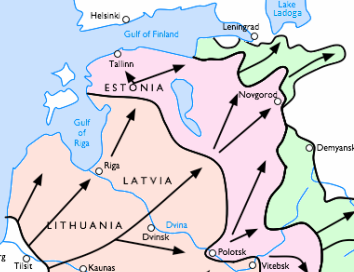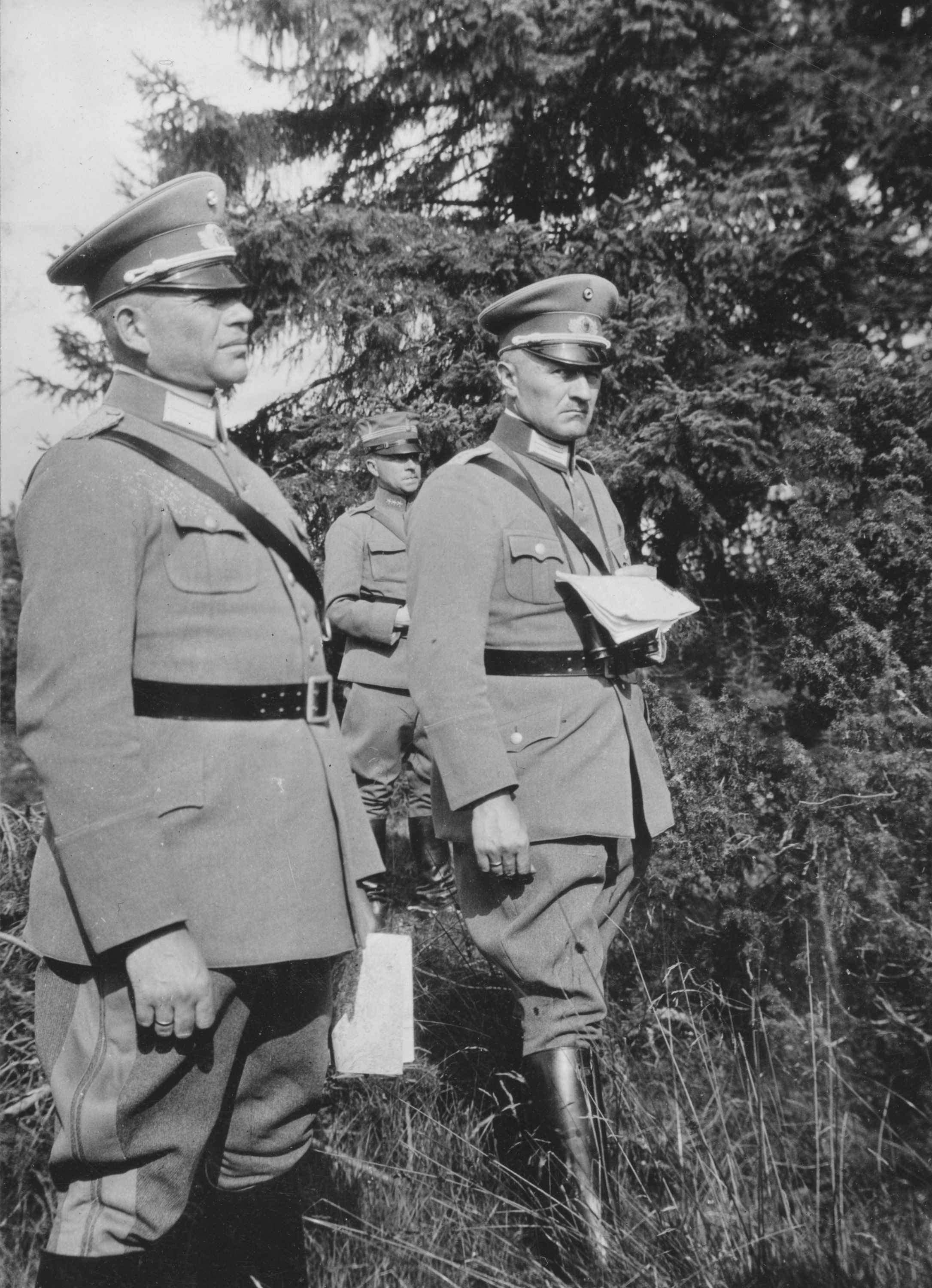|
Panzer Group Kleist
The XXII Motorised Corps (''XXII. Armeekorps (motorisiert)'') was a German army corps during World War II.'' History The XXII. Armeekorps (motorisiert) was created on 26 August 1939 in Wehrkreis X (Schleswig-Holstein, Hamburg, Bremen). The Corps participated the next month in the Invasion of Poland, during which it broke through the southern wing of the Polish Army. In May 1940, the High Command of the XXII Corps also received command over the XIV ( von Wietersheim), XXXXI ( Reinhardt) and XIX Army Corps (Guderian), and renamed as Panzergruppe von Kleist, was engaged in the Battle of France under command of Ewald von Kleist. It played a crucial role in the German victory, when it overwhelmed the French defenses at Sedan, and advanced west reaching the sea at Abbeville. In June 1940, during Fall Rot, the second phase in the Battle of France, Panzergruppe von Kleist was in control of the XIV ( von Wietersheim) and XVI Panzer Corps (Hoepner), and advanced as far as the Spanis ... [...More Info...] [...Related Items...] OR: [Wikipedia] [Google] [Baidu] |
German Army (Wehrmacht)
The German Army (, "army") is the land component of the armed forces of Federal Republic of Germany, Germany. The present-day German Army was founded in 1955 as part of the newly formed West German ''Bundeswehr'' together with the German Navy, ''Marine'' (German Navy) and the German Air Force, ''Luftwaffe'' (German Air Force). , the German Army had a strength of 62,766 soldiers. History Overview A German army equipped, organized, and trained following a single doctrine and permanently unified under one command in 1871 during the unification of Germany under the leadership of Prussia. From 1871 to 1919, the title ''German Army (German Empire), Deutsches Heer'' (German Army) was the official name of the German land forces. Following the German defeat in World War I and the end of the German Empire, the main army was dissolved. From 1921 to 1935 the name of the German land forces was the ''Reichswehr, Reichsheer'' (Army of the Empire) and from 1935 to 1945 the name ''German Army (We ... [...More Info...] [...Related Items...] OR: [Wikipedia] [Google] [Baidu] |
Fall Rot
''Fall Rot'' (Case Red) was the plan for a German military operation after the success of (Case Yellow), the Battle of France, an invasion of the Benelux countries and northern France. The Allied armies had been defeated and pushed back in the north to the Channel coast, which culminated in the Dunkirk evacuation. The operation to complete the conquest of France by the German Army began on 5 June 1940. began with a preliminary attack over the river Somme on the Channel Coast to the Seine, beginning on 5 June and the main offensive by Army Group A on 9 June further east over the river Aisne. Background French defensive preparations By the end of May 1940, the best-equipped French armies had been sent north and lost in and the evacuation from Dunkirk, which cost the Allies French commander Maxime Weygand was faced with the prospect of defending a front from Sedan, along the Aisne and Somme rivers to Abbeville on the Channel, with divisions. The 51st (Highland) Infantry ... [...More Info...] [...Related Items...] OR: [Wikipedia] [Google] [Baidu] |
Corps Of Germany In World War II
Corps (; plural ''corps'' ; from French , from the Latin "body") is a term used for several different kinds of organization. A military innovation by Napoleon I, the formation was first named as such in 1805. The size of a corps varies greatly, but from two to five divisions and anywhere from 40,000 to 80,000 are the numbers stated by the US Department of Defense. Within military terminology a corps may be: *an operational formation, sometimes known as a field corps, which consists of two or more divisions, such as the , later known as ("First Corps") of Napoleon I's ); *an administrative corps (or mustering) – that is a specialized branch of a military service (such as an artillery corps, a medical corps, or a force of military police) or; *in some cases, a distinct service within a national military (such as the United States Marine Corps). These usages often overlap. Corps may also be a generic term for a non-military organization, such as the US Peace Corps and E ... [...More Info...] [...Related Items...] OR: [Wikipedia] [Google] [Baidu] |
France
France (), officially the French Republic ( ), is a country primarily located in Western Europe. It also comprises of Overseas France, overseas regions and territories in the Americas and the Atlantic Ocean, Atlantic, Pacific Ocean, Pacific and Indian Oceans. Its Metropolitan France, metropolitan area extends from the Rhine to the Atlantic Ocean and from the Mediterranean Sea to the English Channel and the North Sea; overseas territories include French Guiana in South America, Saint Pierre and Miquelon in the North Atlantic, the French West Indies, and many islands in Oceania and the Indian Ocean. Due to its several coastal territories, France has the largest exclusive economic zone in the world. France borders Belgium, Luxembourg, Germany, Switzerland, Monaco, Italy, Andorra, and Spain in continental Europe, as well as the Kingdom of the Netherlands, Netherlands, Suriname, and Brazil in the Americas via its overseas territories in French Guiana and Saint Martin (island), ... [...More Info...] [...Related Items...] OR: [Wikipedia] [Google] [Baidu] |
Poland
Poland, officially the Republic of Poland, is a country in Central Europe. It is divided into 16 administrative provinces called voivodeships, covering an area of . Poland has a population of over 38 million and is the fifth-most populous member state of the European Union. Warsaw is the nation's capital and largest metropolis. Other major cities include Kraków, Wrocław, Łódź, Poznań, Gdańsk, and Szczecin. Poland has a temperate transitional climate and its territory traverses the Central European Plain, extending from Baltic Sea in the north to Sudeten and Carpathian Mountains in the south. The longest Polish river is the Vistula, and Poland's highest point is Mount Rysy, situated in the Tatra mountain range of the Carpathians. The country is bordered by Lithuania and Russia to the northeast, Belarus and Ukraine to the east, Slovakia and the Czech Republic to the south, and Germany to the west. It also shares maritime boundaries with Denmark and Sweden. ... [...More Info...] [...Related Items...] OR: [Wikipedia] [Google] [Baidu] |
Kurt Zeitzler
Kurt Zeitzler (9 June 1895 – 25 September 1963) was a Chief of the Army General Staff in the ''Wehrmacht'' of Nazi Germany during World War II. Zeitzler was almost exclusively a staff officer, serving as chief of staff in a corps, army, and army group. In September 1942, he was selected by Adolf Hitler as Chief of the Army General Staff, replacing Franz Halder. In early 1943 he was one of the key figures in the decision to launch Operation Citadel, the last major German attack on the Eastern Front, which ended in defeat. Zeitzler lost faith in Hitler's judgement, and abandoned his position in July 1944 after suffering a nervous breakdown. Zeitzler was regarded as an energetic and efficient staff officer, noted for his ability in managing the movement of large mobile formations. World War I and interwar period Born in Goßmar in the Province of Brandenburg, Zeitzler came from a family of pastors. At the age of 18 he joined the 4th Thuringian Infantry Regiment of the German Ar ... [...More Info...] [...Related Items...] OR: [Wikipedia] [Google] [Baidu] |
Panzergruppe 1
The 1st Panzer Army (german: 1. Panzerarmee) was a German tank army that was a large armoured formation of the Wehrmacht during World War II. When originally formed on 1 March 1940, the predecessor of the 1st Panzer Army was named Panzer Group Kleist (''Panzergruppe Kleist'') with Colonel General Ewald von Kleist in command. Service history Panzer Group Kleist was the first operational formation of several Panzer corps in the Wehrmacht. Created for the Battle of France on 1 March 1940; it was named after its commander Ewald von Kleist. Panzer Group Kleist played an important role in the Battle of Belgium. Panzer corps of the Group broke through the Ardennes and reached the sea, forming a huge pocket, containing several Belgian, British, and French armies. When the armistice was signed, the Group was deployed in occupied France, being renamed to Panzer Group 1 (''Panzergruppe 1'') in November. In April 1941, Panzer Group 1 took part in the invasion of Yugoslavia as part of Fie ... [...More Info...] [...Related Items...] OR: [Wikipedia] [Google] [Baidu] |
Erich Hoepner
Erich Kurt Richard Hoepner (14 September 1886 – 8 August 1944) was a German general during World War II. An early proponent of mechanisation and armoured warfare, he was a Wehrmacht army corps commander at the beginning of the war, leading his troops during the invasion of Poland and the Battle of France. Hoepner commanded the 4th Panzer Group on the Eastern Front during Operation Barbarossa, the invasion of the Soviet Union in 1941. Units under his command closely cooperated with the ''Einsatzgruppen'' and implemented the Commissar Order that directed Wehrmacht troops to summarily execute Red Army political commissars immediately upon capture. Hoepner's Panzer group, along with the 3rd Panzer Group, spearheaded the advance on Moscow in Operation Typhoon, the failed attempt to seize the Soviet capital. Dismissed from the Wehrmacht after the failure of the 1941 campaign, Hoepner restored his pension rights through a lawsuit. He was implicated in the failed 20 July plot again ... [...More Info...] [...Related Items...] OR: [Wikipedia] [Google] [Baidu] |
XVI Panzer Corps
The XVI Army Corps (16th Corps) was a corps in the German Army during World War II. The XVI (motorized) Corps (german: Generalkommando XVI. (mot.) Armeekorps) was activated as a headquarters for motorized units in February 1938 in Berlin. The XVI Corps was assigned to the 10th Army in the German invasion of Poland and to Army Group B during the invasion of France. During the French campaign, the corps fought at the battles of Hannut and Gembloux. On February 17, 1941, the corps headquarters was inactivated in order to form the 4th Panzer Group. In July 1944, ''Generalkommando z.b.V. Kleffel'' was organized as an ''ad hoc'' corps headquarters subordinated to the 16th Army in northern Russia. On October 30, 1944, this headquarters was made permanent and designated the XVI Army Corps. As such, the corps remained under 16th Army command until the surrender of the 16th Army in Courland in May 1945. Area of operations * XVI motorized Corps: ** Poland - September 1939 ** Belgium ... [...More Info...] [...Related Items...] OR: [Wikipedia] [Google] [Baidu] |
Battle Of France
The Battle of France (french: bataille de France) (10 May – 25 June 1940), also known as the Western Campaign ('), the French Campaign (german: Frankreichfeldzug, ) and the Fall of France, was the Nazi Germany, German invasion of French Third Republic, France during the Second World War. On 3 September 1939, France French declaration of war on Germany (1939), declared war on Germany following the German invasion of Poland. In early September 1939, France began the limited Saar Offensive and by mid-October had withdrawn to their start lines. German armies German invasion of Belgium (1940), invaded Belgium, German invasion of Luxembourg, Luxembourg and German invasion of the Netherlands, the Netherlands on 10 May 1940. Fascist Italy (1922-1943), Italy entered the war on 10 June 1940 and attempted an Italian invasion of France, invasion of France. France and the Low Countries were conquered, ending land operations on the Western Front (World War II), Western Front until the Normandy l ... [...More Info...] [...Related Items...] OR: [Wikipedia] [Google] [Baidu] |
Paul Ludwig Ewald Von Kleist
Paul Ludwig Ewald von Kleist (8 August 1881 – 13 November 1954) was a German field marshal during World War II. Kleist was the commander of Panzer Group Kleist (later 1st Panzer Army), the first operational formation of several Panzer corps in the Wehrmacht during the Battle of France, the Battle of Belgium, the Invasion of Yugoslavia and Operation Barbarossa, the invasion of the Soviet Union. During the Battle of France, units under Kleist's command included Heinz Guderian's armoured corps and spearheaded the ''"blitzkrieg"'' attack through the Ardennes forest, outflanking the Maginot Line. His panzer divisions eventually pushed deep into France, resulting in Allied defeat. Kleist was appointed commander-in-chief of Army Group A during the last days of Case Blue, the 1942 German summer offensive in southern Russia. His disagreements with Hitler over strategic decisions led to his dismissal in March 1944 after the German defeat in right-bank Ukraine. Following the war, Kleist ... [...More Info...] [...Related Items...] OR: [Wikipedia] [Google] [Baidu] |
Heinz Guderian
Heinz Wilhelm Guderian (; 17 June 1888 – 14 May 1954) was a German general during World War II who, after the war, became a successful memoirist. An early pioneer and advocate of the " blitzkrieg" approach, he played a central role in the development of the panzer division concept. In 1936, he became the Inspector of Motorized Troops. At the beginning of the Second World War, Guderian led an armoured corps in the Invasion of Poland. During the Invasion of France, he commanded the armoured units that attacked through the Ardennes forest and overwhelmed the Allied defenses at the Battle of Sedan. He led the 2nd Panzer Army during Operation Barbarossa, the invasion of the Soviet Union. The campaign ended in failure after the German offensive Operation Typhoon failed to capture Moscow, after which Guderian was dismissed. In early 1943, Adolf Hitler appointed Guderian to the newly created position of Inspector General of Armoured Troops. In this role, he had broad responsi ... [...More Info...] [...Related Items...] OR: [Wikipedia] [Google] [Baidu] |




